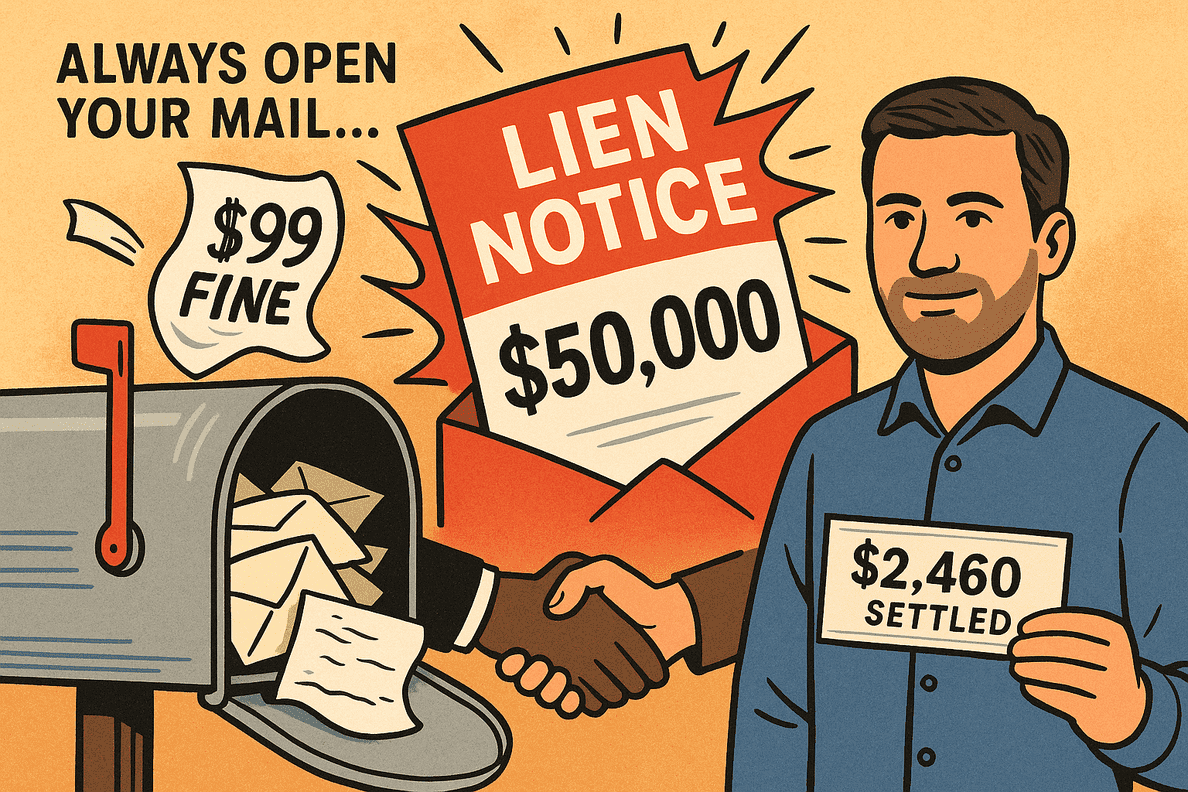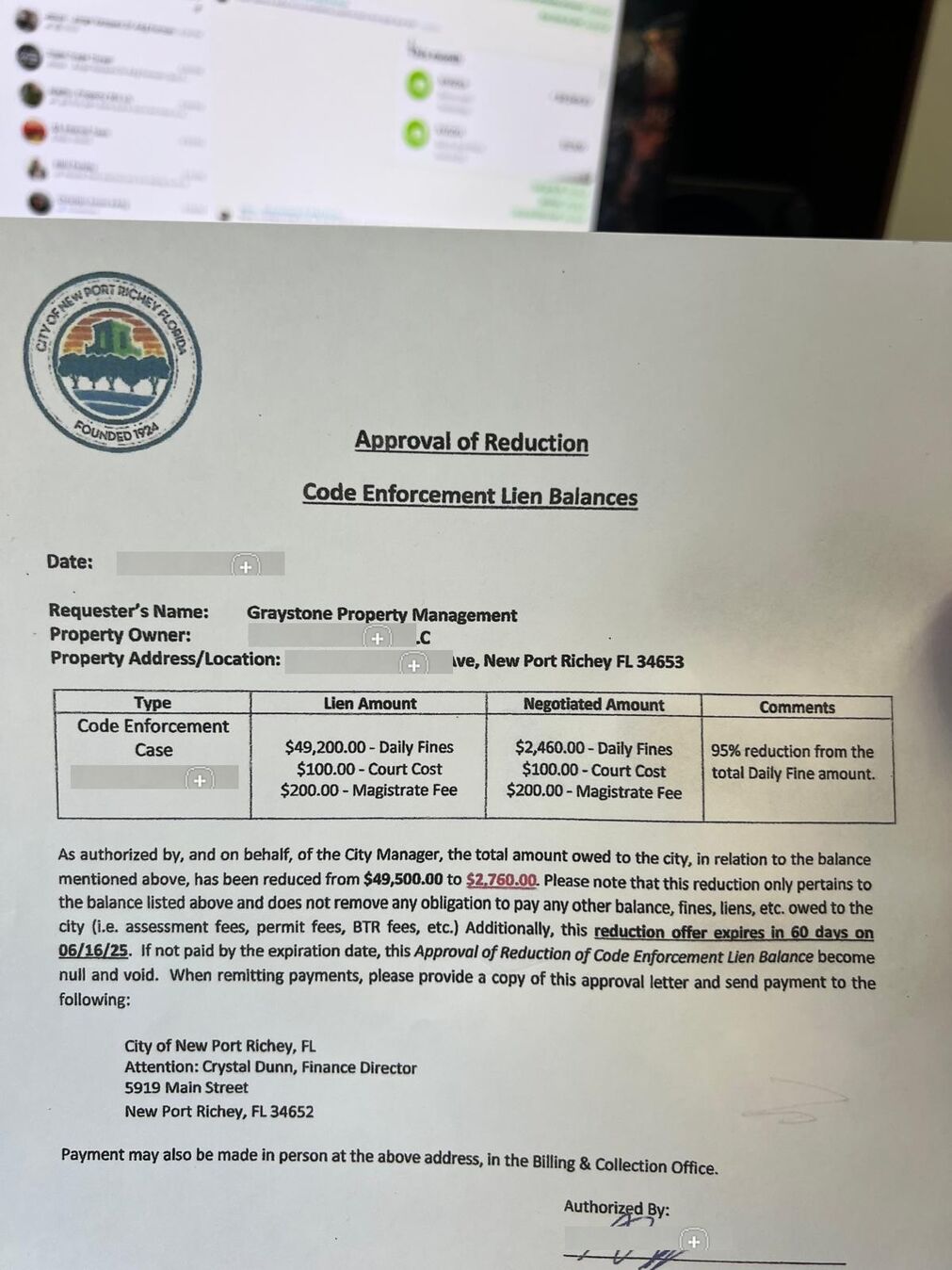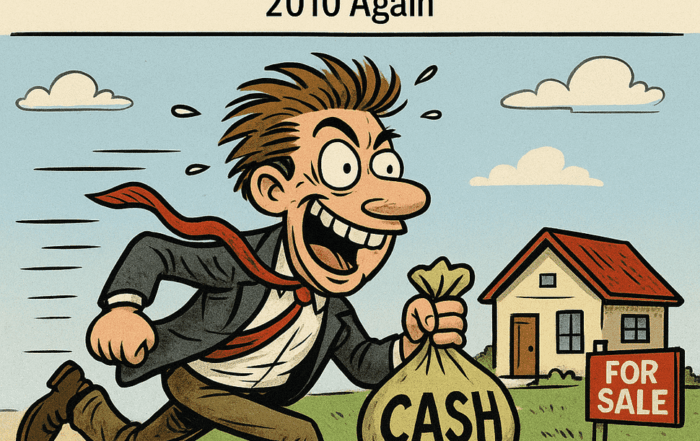
How a $100 Fine Turned Into a $50,000 Code Enforcement Lien (and How I Negotiated It Down to $2,460)
By Jorge Vazquez
Let me tell you a story that might sound crazy—but if you’ve been in this game long enough, you’ve probably had a similar experience.
It all started with a simple rental certificate in the city of New Port Richey.
Yep. That little thing. Just a small oversight.
I was busy juggling rehabs, acquisitions, property management headaches, and a handful of closings. So when a small fine came in—something like $99—I blinked and figured I’d take care of it later.
Well… “later” turned into a $50,000 code enforcement lien.
I know. From $100 to $50,000? Sounds like the city was calculating the fine using Dogecoin math. But here’s what actually happened, and more importantly, how I handled it like a true real estate investor.
The Setup: How the Lien Started
This was a property I owned in New Port Richey. I was managing it like I do dozens of others: tenant in place, rent coming in, everything on track. Except for one little thing—the annual rental certificate required by the city.
For some context: In New Port Richey, if you rent out a property, you’re required to register it and pay a small annual fee. Think of it as a “permission slip” to be a landlord in that city. Harmless, right?
Well, I missed it.
The city fined me $99, and I didn’t pay it immediately. No big deal… until that $99 started compounding daily.
And here’s the kicker: Code enforcement liens in Florida don’t just sit quietly. They GROW. Daily. Like a weed you forgot to pull.
Before long, I had a letter in my inbox with numbers I never expected: “Lien Balance: $49,900.”
Wait—How Is That Even Legal?
I know what you’re thinking. “That’s not legal!” Oh, but it is.
Here’s the deal with code enforcement liens in Florida:
-
Once a fine is issued and not paid, the municipality can assess daily fines, sometimes $250 or more per day.
-
They tack those on retroactively, even if you eventually fix the issue.
-
If you’re not watching, you can rack up tens of thousands in fines on a simple oversight.
It’s like compound interest—but for nightmares.
What I Did (And What I Wish I Did Sooner)
When I saw the balance, my heart dropped. But then I did what I always do when the chips are down—I got to work.
First, I called the city.
Let me pause here and give you a gold nugget:
**If you ever get a code enforcement fine—**call the department, don’t just email. Build rapport. Ask for the name of the person managing your case. Be polite, but persistent.
So I got someone on the line and said:
“Hey, I’m Jorge. I own 30+ rentals, and I take pride in keeping everything clean and compliant. This one slipped past me. Let’s fix this together.”
They appreciated that I took ownership and didn’t get angry or defensive. That’s step one in any negotiation: take the emotion out.
The Negotiation: Turning $50K into $2,460
Now comes the fun part.
After a few calls and some back-and-forth, the city said:
“We can’t waive the lien. But you can file for a lien reduction hearing.”
I filled out the application, included a letter explaining the situation, and showed proof that everything had been corrected.
Here’s the argument I made:
-
It was a technical violation, not a safety hazard.
-
The property was well-maintained. I wasn’t a slumlord.
-
I wasn’t avoiding compliance. I just missed the notice.
-
I’m a responsible investor in the community. I’ve brought tons of rentals into compliance and kept good tenants housed.
At the hearing (which was surprisingly quick), they offered a settlement: $2,460.
From fifty grand down to twenty-four hundred bucks.
I took it. Paid it. Smiled. Moved on.
What I Learned (and What You Should Too)
After doing this for over 20 years, here’s what I can tell you:
-
Never ignore city mail.
That “little envelope” from code enforcement might be more expensive than you think. If you’re not checking your mail or email consistently, you’re asking for trouble. -
Track your rental registrations.
If you own properties in cities with rental certificates, put reminders in your calendar. Automate it. Get your VA or property manager to track them. -
Build relationships with city officials.
It’s easy to blame “the system,” but these folks are just doing their job. If you’re polite and persistent, most are happy to help. And when they know you, they’re far more likely to reduce or delay enforcement. -
Negotiate everything.
Just because a lien says $50,000 doesn’t mean you owe $50,000. Everything is negotiable, especially if you’re willing to fix the problem and show good faith. -
Act fast when fines start.
The longer you wait, the more leverage you lose. Speed is your friend in these cases.
Bonus Tip: How This Almost Affected a Refinance
Here’s something I didn’t mention: I was in the middle of a DSCR refinance on this property.
Guess what came up in the title search?
Yep—the lien.
The lender immediately paused the process and said, “We can’t move forward until this is resolved.”
So not only was this a problem on its own, it could have cost me the whole refinance and cash-out strategy.
Once again, this is why speed matters.
Let Me Be Real with You
If you’re reading this and thinking, “Man, I hope that never happens to me,” let me say this:
It will. Or something like it.
When you manage dozens of properties, there’s always something slipping through the cracks. The key is how fast you fix it—and how well you own your mistakes.
That’s the difference between amateur investors and seasoned pros.
I’ve had more fines than I can count… but I’ve also negotiated most of them down, kept my portfolio growing, and stayed focused on the long-term game.
Closing Thoughts
This wasn’t a win I wanted to earn—but I’m glad I did.
Because every investor hits roadblocks. But the real ones—those of us building generational wealth—we turn setbacks into strategies.
So next time you get a fine, don’t panic.
Pick up the phone. Get to work. And remember, it’s just part of the journey.
Keep it consistent, stay patient, stay true—if I did it, so can you!
Ready to connect and strategize? Contact me at http://graystoneig.com/ceo – Jorge Vazquez, CEO of Graystone Investment Group & its subsidiary companies and Coach at Property Profit Academy.
Pick your expert. Book your free 15-minute consult now. We are here to help!
Our Top Articles
The College Rental That Nearly Schooled the Landlord: Lessons from Bradley’s Student Housing Fiasco
Jorge Vazquez2025-07-10T19:32:35+00:00July 10th, 2025|Comments Off on The College Rental That Nearly Schooled the Landlord: Lessons from Bradley’s Student Housing Fiasco
A "Safe Bet" Gone Sideways Bradley is one of those agent-investors we all admire. Sharp, experienced, hands-on, [...]
Opportunistic Buyers Are Back: Why Florida’s Real Estate Market Feels Like 2010 Again
Jorge Vazquez2025-07-09T01:10:13+00:00July 8th, 2025|Comments Off on Opportunistic Buyers Are Back: Why Florida’s Real Estate Market Feels Like 2010 Again
If you were around during the aftermath of the 2008 crash, you might remember that eerie silence around 2010—the [...]
Can Buying Real Estate in Florida Help You With Immigration?
Jorge Vazquez2025-07-07T18:54:31+00:00July 7th, 2025|Comments Off on Can Buying Real Estate in Florida Help You With Immigration?
Can Buying Real Estate in Florida Help You With Immigration? So you’re wondering, “If I buy a couple rental [...]
Property Profit Academy:
✔ Learn to buy properties with little to no money down.
✔ Build a $10M portfolio step by step.
✔ Master strategies like BRRRR and house hacking.










